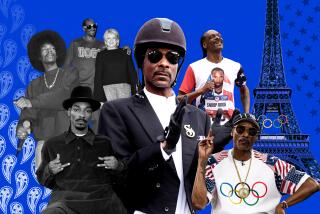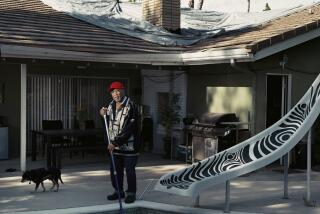Pop Music : G Marks the Spot : Scoot over, Snoop. Your longtime pal Warren G has reaped millions by shunning computerized musical sampling for real live R&B.; It’s Long Beach G-funk, by way of P-funk.
In the history of pop music, a few locales have come to symbolize revolutions in at titude and sound.
There was New York’s 52nd Street for the be-boppers who clubbed there in the ‘40s. Memphis’ Union Street, where Sun Records housed the rockabilly antics of Elvis Presley and Jerry Lee Lewis in the ‘50s. And London’s Abbey Road, where the Beatles transformed a straight classical recording studio into a rock ‘n’ roll shrine in the ‘60s.
Now, there’s the intersection of 21st Street and Lewis Avenue in East Long Beach--the crossroads of the most influential and popular brand of hip-hop music in the ‘90s: G-funk.
“Twenty-first and Lewis, that’s like the heart of it,” says rapper-producer Warren G in his trademark Southern-sounding drawl as he sits in the living room of the $650,000 two-story house in Lakewood that he bought last year with a chunk of his recording royalties.
The corner--which is pictured on the cover of Warren G’s multi-platinum debut album, “Regulate: The G-Funk Era”--is a landmark in many of the scenarios that he and his early collaborators Snoop Doggy Dogg and Nate Dogg have created.
“I used to hang out at this spot, and my homeboys [were] telling me, ‘You gonna have to start making some money, ‘cause you just can’t be sitting here with us,’ ” he says.
That peer pressure briefly led Warren, who was working as an electrician at the Long Beach Naval Shipyard, from the straight and narrow. He started running with the Long Beach Crips and, with Snoop, was a minor-level drug hustler on the side, culminating with an arrest at 17 for illegal gun possession.
“[The scene] was rougher than the stuff I was seeing when I was little,” he says, “ ‘cause there was people shooting at me, and we was shooting back and all kinda stuff. We was going in and out of jail.”
Measured against the headline-grabbing murder charge facing Snoop Doggy Dogg and the sexual abuse conviction of rapper Tupac Shakur, Warren G’s skirmishes with the law were minor--and in many cases, he says, were a product of police harassment. But it was enough to make him re-examine his path.
“I wasn’t listening to my father at first, ‘cause he kept telling me, ‘If you keep doing that stuff with your boys, you’re gonna go to jail.’
“When it actually happened, it tripped me out. Snoopy was in jail and he called me--and I told him, ‘We need to vow to ourselves to do this music thing. Even if we have to be broke, if we put our heart into it I think we can do it.’ ”
More than idle talk, Warren G’s admonition three years ago was right on the money. Not only have he and Snoop delivered critically acclaimed blockbuster albums, but they have also accelerated the momentum of a rap production style pioneered by Warren G’s celebrated stepbrother Dr. Dre: G-funk.
G -funk--for gangsta funk --has reintroduced the notion of live R&B; to rap, and a generation jaded by computerized musical sampling has embraced it.
With Warren G, Dre and Compton’s DJ Quik behind the studio mixing boards, R&B; becomes balmy and rugged, menacing yet smooth--as it was in the ‘70s when Sly & the Family Stone and Kool & the Gang were at their creative heights. Warren’s sound is a blend of sheer melody, fluent bass lines and complex turns at the keyboard that might make the eyes of Parliament-Funkadelic’s Bernie Worrell well up with tears.
“I get the smooth, wavy sounds that catch a person’s ear and will make him say, ‘Damn, what is that?’ ” Warren says. “That old stuff from the ‘70s, they had some real good sounds, and people don’t make music like that no more. I’m like one of the chosen ones, doing it like they used to, with all live stuff and original tracks.”
In a rare display of smugness, he says, “I see there’s a lot of people trying to do it now.”
He suddenly smiles disarmingly and adds, “I don’t mind.”
With album sales approaching 4 million and a recent job producing some tracks for Michael Jackson’s upcoming album, Warren G, 24, has more than turned his life around.
The lanky performer leans back on a brand-new blue leather couch and looks around his expansive house--miles away in spirit, if not actual distance, from the rough streets where he made a name for himself as G-Dub. Ron Griffin, his uncle and manager, hovers nearby, monitoring the interview.
The sparse furnishings--a few couches, boxes of studio equipment, a 56-inch television and an ominous portrait of the lord of the manor on the mantel--suggest that the young star has only recently focused on matters beyond recording sessions and concert tours.
“I like everything about this place,” he says. Picking up a pile of fabric samples, he displays the types of carpet he plans to put in different sections of the house, when he finds time.
“This is going to be in the main room,” he says, pointing at a charcoal shag. “In the bathroom, the drapes are gonna look like this. And right over there,” he says, indicating the spot where the TV sits, “there’s gonna be a big ol’ G right there.”
The three-car garage is occupied by an immaculate turquoise ’64 Impala, a gray Mercedes SL 600 convertible and a dark-gray Grand Cherokee Jeep.
“It’s a different world. I don’t care what nobody says about it,” says Griffin, a 6-foot-4 former Marine. His face shines with pride as he watches his nephew toy with the Impala’s hydraulics, making the front end bounce and tilt.
“Being on top is different than being hungry,” Griffin says. “We’ve been introduced to a lot of new things in our life. It’s a different world. I don’t care what they tell you.”
W arren Griffin III, the only son of McDonnell Douglas airplane mechanic Warren Griffin Jr. and dietitian Ola Griffin, grew up in East Long Beach with his mother and three sisters after his parents separated when he was 4.
When he wasn’t running around King Park playing football and selling candy with little Snoop and Nate, he was searching through his father’s stacks of dusty vinyl and soaking up the sounds of Al Green, Bobby Womack, Les McCann, Chick Corea and Wes Montgomery.
“That’s the reason I like messing around with so many different sounds,” Warren says. “I used to listen to a lot of his jazz music and ‘70s soul-funk. Sometimes I would just fall asleep, music on, headphones blaring, knocked out for hours.”
When they were in their late teens, Warren, Snoop Doggy Dogg and Nate Dogg began recording songs together in a little studio behind Long Beach’s VIP Records, first calling themselves Three the Hard Way, after the blaxploitation movie of the same name, and later 213.
“I was doing the tracks and rapping a little bit,” Warren recalls. “Nate would sing, hummin’ his tunes. He grew up in church--he used to be in the choir and stuff--and me and Snoop used to [tell him] ‘Throw some different stuff into what you singing, like some gangsta stuff.’ He’s the bomb.
“Snoopy was doing all the rapping. One thing he used to do when we was coming up was he’d write a gang of songs, and we’d be doing our thing. Then he’d get mad at me about something and throw everything away. He just threw [the lyrics] in the trash. That used to burn me out.”
The 213 tapes circulated up and down the coast in 1990, earning a reputation in the hip-hop underground. But a minor beef sent Snoop and Warren their separate ways.
A bachelor party hosted by Warren’s stepbrother Andre Young--otherwise known as N.W.A. member and producer Dr. Dre--triggered their reconciliation.
“I had some songs that [213] had done. They were playing tapes, so I threw our stuff in there,” Warren recalls. “All of a sudden, everybody was like ‘What is that?’ I told Dre that it was me and my crew, and he was like ‘Y’all come to the studio. Monday. We can do this.’ ”
“Shooooot!!” Warren exclaims, a wide smile on his face. “I went back to Long Beach to my buddy Rump’s house and told him, ‘Find Snoopy, I don’t care if we arguing or not, Dre wants to get busy!’ Snoop came over, we made up, and it was on like popcorn.”
The subsequent recording sessions led to the first Dre and Snoop collaboration, the 1992 single “Deep Cover,” and later the album that would fully spring G-funk on the world: Dre’s “The Chronic.”
Between his production and dialogue appearances on “Chronic,” Warren G did some outside production work. One song in particular--Mista Grimm’s “Indo Smoke”--caught the attention of Chris Lighty, president of Violator Records, a subsidiary of the prominent New York label Def Jam, which boasts such rap icons as Method Man, LL Cool J, Public Enemy, Slick Rick, Onyx and Redman. Lighty signed Warren G in 1993 to a lucrative recording and production deal.
Boosted by the smash single “Regulate”--a smooth collaboration with Nate Dogg over a rhythm track based on, of all things, Michael McDonald’s mushy 1982 hit “I Keep Forgettin’ (Every Time You’re Near)”--Warren G’s “Regulate: The G-Funk Era” sold a million in a flash.
Was he surprised that a song detailing an averted carjacking and a subsequent party with sexy women could end up spending weeks on top of the pop charts?
“Shooooo, yeah,” he says. “A lot of people label it gangsta and say that it’s glorifying violence, but [radio] played it. It’s just good music, and we just telling a story on some real stuff. I saw that happen right on 61st Street.”
I t’s fitting that one of the few items in Warren G’s living room is a Mini Moog keyboard. This technological wonder of yesteryear, which has helped define the sound of the Isley Brothers and Stevie Wonder, now fuels Warren G’s smooth production style. It’s the most important element in the young rapper’s musical arsenal.
“I got that one right there from Dre,” he says, pointing at the scratched-up instrument. “He let me have it--well, he never asked for it back.”
Although Warren G has his own style, he clearly idolizes Dre.
“I hope I can be up there and be large like Dre and Quincy Jones,” he says. “They’re popular as producers, not as singers or rappers.”
Rising from the couch, he walks back to the garage and opens the door of the Mercedes. Rummaging through the tapes on the floor, he finds a cassette with the three tracks that he produced a few months ago for Michael Jackson’s upcoming album.
Moments later, the garage is filled with heavy bass evened out with lush orchestration and bouncy melodies reminiscent of Jackson’s “Off the Wall” period. It offers the perfect kick to make it accessible to the hard-core urban audience that has eluded Jackson since the “Bad” album in 1986.
The music from the Mercedes’ speakers makes a crumpled McDonald’s bag scurry around the passenger seat like an impatient child. If these instrumental tracks are any indication, Warren G has a long career ahead, independent of his work as a rapper.
“The next album is gonna be the bomb, because I learned a lot,” he says, leaning against the driver’s seat. “I’m gonna fill it with a lot more, with the maximum on percussion, like some jazz [expletive]. It’s gonna trip people out, ‘cause I did it my way. It’ll be cool.”
Warren G has also started his own label, G-Funk Records, distributed by Def Jam, and has plans to build a community center in Long Beach that would provide the same opportunities for recreation that he and Snoop enjoyed before violence took over the streets. Warren G has a busy year coming up, but it doesn’t seem to faze him.
“I didn’t think me and Snoopy would get this large, but I knew we’d get there some kind of way,” he says with a smile. “After a while I figured, ‘I might as well just go on and give it a shot.’ It was a beautiful shot, so now it’s on and crackin’.”
CAROL CHEETHAM / For The Times
More to Read
The biggest entertainment stories
Get our big stories about Hollywood, film, television, music, arts, culture and more right in your inbox as soon as they publish.
You may occasionally receive promotional content from the Los Angeles Times.










